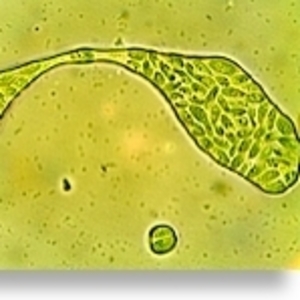Researchers publish 'survival of the fattest' algae discovery

November 6, 2013
BY TU Delft
Algae are interesting candidates for the large-scale production of biodiesel. Researchers at TU Delft have developed a clever way of finding the fattest and therefore the most suitable examples among all the many species of algae. They will publish their discovery this week in the scientific journal Energy & Environmental Science.
“The ultimate goal of our research is to make oil-producing algae as fat as possible, then press the oil out of them and finally produce biodiesel suitable for cars from this oil,” explained doctoral student Peter Mooij of TU Delft.
Advertisement
Advertisement
A major threat to the stable cultivation of oil-producing algae is infection by other, thinner algae. One option is to use a sealed cultivation system and keep unwanted algae out of the system by means of sterilization. Although this is theoretically possible, it would be practically infeasible and extremely expensive to do this on a large scale.
“Our method is more suitable for large-scale algae production,” said Mooij. “We try to select for a particular characteristic and not for a particular species of algae. We are unconcerned whether species A or species B is used in our system, as long as they have the characteristic ‘fat.’ So all algae are welcome in our system.”
Algae produce oil to store carbon and energy. Energy and carbon are useful to them during the long sunless periods or if it is cold. However, algae also need energy and carbon for their cell division and to extract nutrients such as phosphate and nitrogen from the water.
Advertisement
Advertisement
Mooij took this fact as his starting point. “The principle works as follows—we go to the nearest pond and fill a test tube with algae. Back in the lab, we put the tube in a reactor. Then we provide the algae with light and CO2 during the day. This is enough for them to produce oil, however they are unable to divide. They need nutrients for cell division and we only give them these in the dark. To absorb the nutrients, they use energy and carbon. This means that only the fattest algae can divide, as they have stored energy and carbon during the day. By removing some of the algae every day, the culture will eventually exist of only the fattest algae—survival of the fattest!”
Using a test reactor, Mooij and his colleagues have now demonstrated for the first time that this principle really works. They will publish their discovery this week in the scientific journal Energy & Environmental Science.
Unfortunately, there is one important caveat, explained Mooij. “The survival of the fattest principle turns out to work beautifully,” he said. “At the beginning there is a whole zoo of algae and, over time, the system does indeed almost become a monoculture. However, the fat alga is not producing oil yet. Algae do not produce only oil for energy and carbon storage, but starch too. Out test environment is selective where it concerns storage in general, but not yet for the specific storage of oil or starch. We will need to make the culture environment even more specific to achieve this. That's what we are working hard at now.”
Related Stories
U.S. fuel ethanol capacity fell slightly in April, while biodiesel and renewable diesel capacity held steady, according to data released by the U.S. EIA on June 30. Feedstock consumption was down when compared to the previous month.
The U.S. EPA on July 8 hosted virtual public hearing to gather input on the agency’s recently released proposed rule to set 2026 and 2027 RFS RVOs. Members of the biofuel industry were among those to offer testimony during the event.
The USDA’s Risk Management Agency is implementing multiple changes to the Camelina pilot insurance program for the 2026 and succeeding crop years. The changes will expand coverage options and provide greater flexibility for producers.
The USDA’s National Agricultural Statistics Service on June 30 released its annual Acreage report, estimating that 83.4 million acres of soybeans have been planted in the U.S. this year, down 4% when compared to 2024.
SAF Magazine and the Commercial Aviation Alternative Fuels Initiative announced the preliminary agenda for the North American SAF Conference and Expo, being held Sept. 22-24 at the Minneapolis Convention Center in Minneapolis, Minnesota.
Upcoming Events










